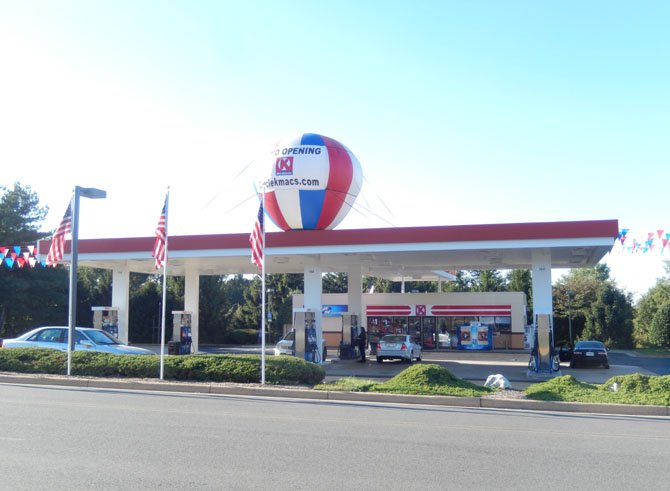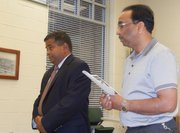The Centre Ridge Exxon’s owner hopes to sell hot dogs and alcohol in his station’s convenience store. Photo by Bonnie Hobbs.
Raj Gupta just wanted an OK to add hot dogs to his convenience store’s offerings at the Centre Ridge Exxon station. But the high cost of doing business in Fairfax County has now made him request approval to sell alcohol there, too.
In turn, that issue is spurring a local, land-use group to reevaluate – and possibly overturn – one of its long-held tenets, that drivers not be allowed to buy alcohol and gas at the same place. It’s a domino effect, but no one’s playing games.
“We’ve got a moral question to deal with,” said Mark McConn of the West Fairfax County Citizens Association (WFCCA) Land-Use Committee. “Do we bow down to a business at the expense of protecting people?”
The whole issue began Aug. 19, when Boopendra Prakash of TPS, a land-development engineering firm representing the Centre Ridge Exxon appeared before the WFCCA. At that time, the panel voted to recommend to the county Planning Commission that the station’s convenience store be able to sell hot dogs.
Trouble was, when Prakash and the station’s owner, Raj Gupta, tried to obtain a county permit to do so, they learned the filing fee for it is $10,000. So they both came to the Sept. 16 WFCCA meeting to ask permission to sell beer and wine, as well.
“I hadn’t intended to come back again,” said Prakash. “But this permit costs $10,000 and a building permit costs $5,000 – which [at $1 apiece] equals 15,000 hot dogs to sell to break even.”
The Centre Ridge Exxon is at 6330 Multiplex Drive in Centreville, and Gupta’s owned and run it since 2000. And over the years, a great deal has changed.
“In the 1980s, when 7-Elevens and gas stations couldn’t sell certain food items, the proffer was written that they couldn’t sell alcohol,” said Prakash. “It’s now 2014, and a 7-Eleven across the street can sell five coolers of beer and wine, and it’s the same way for the Shoppers Food Warehouse, 200 feet away.”
So now, he said, the Exxon wants to convert three or four of its 10 coolers to be stocked with beer and wine for sale.
“We have a quick-service food store,” said Gupta. “Most of our customers are local and ask us why we don’t sell beer and wine. It takes them 30 minutes to buy it at Shoppers. So this would give them the service they need and would also give us some more small revenue in these tough times.”
“Mr. Gupta would like to stay competitive and take some of the market share from [the other nearby businesses],” Prakash told the panel. “I appeal to your sense of reason.”
“It’s been a longstanding position of the committee to not allow sales of alcohol at gas-station convenience stores,” said land-use committee Chairman Jim Katcham. “But there are also laws that provide for no drinking and driving, and no drinking and driving with open containers – so I’m evolving. We’re a land-use group and shouldn’t control someone’s economics, so I no longer support that position.”
McConn disagreed. “I’m against it; I don’t want people to buy a cold beer and get back into the car and drive away,” he said. “I don’t want them to have the convenience to get behind the wheel with a six-pack on the front seat.”
He then asked Gupta, “Are you going to get out there and monitor that people don’t open the beer before driving away? Drinking and driving is still a big issue today.”
“Mark, what’s the difference between buying a cold six-pack and then going and getting gas and driving away?” asked Katcham.
“It’s not convenient to get that alcohol,” replied McConn. “People will have to make a concerted effort to get out of their car, stand in line [at a grocery store or 7-Eleven] and get it.”
WFCCA’s Steve Chulick said he had mixed feelings about this matter. “I’m torn,” he said. “I don’t want to encourage people to drink and drive. But with all the stores surrounding the gas station, it’s still relatively convenient to buy alcohol.”
“To me, it’s like opening Pandora’s box,” said McConn. “All the other gas stations would want to sell alcohol, too.”
But, said Sully District Planning Commissioner John Litzenberger, “The WFCCA is the only land-use group in the county that forbids it. At the Dulles Expo Center, we allowed the Exxon there to sell beer by the case or six-pack, and wine, but it could not be consumed on the premises.”
“I’m kind of where Jim is on this,” he continued. “It is evolving; times have changed. If people don’t get their alcohol here, they’ll get it elsewhere. I think compromise is good.”
Agreeing with Litzenberger, At-Large Planning Commissioner Jim Hart told the panel, “You all are unique among the land-use committees on this point.” He also stressed that, decades ago, when Jim McDonnell was the WFCCA Land-Use Committee’s chairman, “One of his concerns was that Centreville would become a destination for alcohol because things weren’t so built-up then.”
And throughout the years that followed, said Hart, “This committee has been consistent that gasoline and alcohol not be sold at the same spot. So if the dam bursts and you’re going to change your policy on it, you’ll have a lot of applications. So you need to be consistent on how you handle them. There may be limitations on hours or quantities, but you shouldn’t do it piecemeal.”
Furthermore, he said, if the WFCCA votes to allow sales of beer and wine at gas stations, “You need to decide under what circumstances alcohol sales would be appropriate, so you’re fair to everybody. Maybe this deserves a broader consideration – you should look at the big picture.”
Regarding sale hours, Litzenberger said the Virginia ABC won’t let gas stations sell alcohol after midnight. And Gupta said his convenience store isn’t open 24 hours, anyway. It’s open until 11 p.m., every day except Friday and Saturday, when it closes at midnight.
Then WFCCA member Carol Hawn brought up another point. “If we make a change, then it behooves us to contact everyone who’s ever come in and asked us [for permission] to sell alcohol,” she said. “We should let them know that they now have that option; it’s our responsibility to do that.”
Meanwhile, she continued, “We have time to consider what we’re going to do. This is a big thing. We should get together as a committee, see what’s allowed [legally] and determine what we want to say before making a decision on this application.”
Since, at the meeting time, the station hadn’t yet filed an application to sell alcohol on its premises, Katcham and Hawn advised Prakash to go ahead and do so because it’ll take six months before county staff is through processing it.
Pleading his case, Gupta said, “I’ve had a beer-and-wine license at other gas station for 18 years, and we’ve always been responsible. BJ’s sells beer and gasoline both, and it’s difficult to explain to the customers why we can’t. It puts us at a disadvantage.”
“This is a quick-service food store, and it’s allowed there elsewhere in the county,” added Prakash. “I implore you to release your grip so this gentleman can run his store competitively.”

